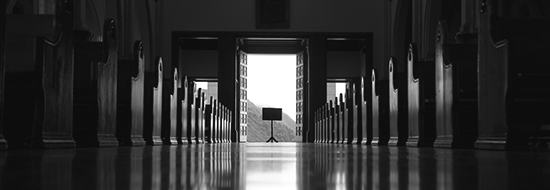QUESTION #2: Please define ‘post-modernism’ and provide some context for how it’s affecting our culture today.
Answer:
Dr. Nathan Crockett:
“Post-modernism wants to question any type of absolute and there’s debate. I think sociologists, some are saying we now live in a post-post-modern time period because so many people have seen the fallacies of post-modernism, but potentially, for instance, in universities, oftentimes there’s still this post-modern ideology and to introduce another big word, you have the word epistemology, which is the study of human knowledge, which tries to answer basically how do we know what we know?
And if you look at, for instance, what sometimes is called pre-modern epistemology, that would be typically the Middle Ages up through the Reformation, most experts would date that up through 1700, what you would find is that Revelation was supreme, so people believed that they could answer the question, “How do I know what I know? Well, I can reason things through”. They had math, they had logic. “I can sense things with my five senses,” they sometimes called them ‘pierces’, “and what do I hear, what I do I taste, what do I see?”
But preeminently, I like to picture this to students almost like pyramid and at the top of that triangle is Revelation. During the Middle Ages, during this what we sometimes call pre-modern epistemology, Revelation was the king. It kind of trumped all and that was typically a good thing because people believed the Bible. If you lived during this time period, you would probably live and die and never meet a self-proclaimed atheist. Virtually everybody believed in God, they believed the Bible was God’s word. Many of them, during the Middle Ages in particular, were overly influenced by the Roman Catholic Church, so they believed anything that the Roman Catholic Church told them, but yet they had this …
They read about a miracle in Scripture, they heard about a miracle, they believed it, because God said it. Maybe it didn’t line up with their reason, it didn’t make sense to them how somebody could walk on water, it didn’t line up with what they had seen or observed empirically, they’d never seen somebody able to walk on water, but if the Bible said it, they believed it.
When you get to approximately 1700, that’s when we usually date the Enlightenment, and the Enlightenment basically is society as a whole, not all of society, but much of society, thinking that they had been restricted by religion and belief in God and trying to overthrow that. Then as they sought to overthrow that, they basically took that category of Revelation, or God’s word, or what we know from God and just moved it off the scene and elevated human reason. They basically said, “We can reason our way to anything,” and they taught that mankind is good and getting better and so on and much of secular thought still kind of believes that lie that if only we could perfectly educate someone, they would be incredibly good and there’d be no more sin in the world and no more evil.
The only problem in the world is a lack of education, and yet time and time and time again, we’ve seen that in various societies and various countries that you can educate a person and they get more creative at ways to do evil things, oftentimes. And so post-modernism basically was a reaction, even to modern epistemology, and we can get more into the history of that later if we want, but oftentimes it’s dated around 1950, where basically with all the problems with modern epistemology, post-moderns had said, “We can’t trust our reason anymore, we can’t trust our sense, we can’t trust God or Revelation.”
And so post-modernism really questions any kind of worldview at all, not just the Christian worldview, but one philosopher, Jean-Francois Lyotard said “Post-modernism is incredulity towards meta-narratives.” He was saying it’s being skeptical of any kind of big story. It’s saying “Really? You think you can explain it all?” And whether that meta-narrative is Hinduism or Buddhism or Fascism or something true like Christianity, post-modernism is just skeptical. It kind of comes with a big, giant question mark and says “Prove it.” Or “How do you know you’re not deceived?”
So, we can talk more about post-modernism as we go, but this would be a sampling of how we’ve gotten to where we are as a world, and I think particularly when I deal with 18, 19-year olds, they don’t even know they’ve grown up in a post-modern culture. It’s like does the fish even know that it’s wet? It’s in the water all the time, and so they have been influenced by post-modernism, oftentimes without even realizing it and I think if you go back to the Constitution, or the Founding Fathers or many of the things that you all talk about on your radio show, we start to realize how much things have changed in these years.”
To listen to the entire program, please click HERE.


Recent Comments